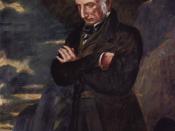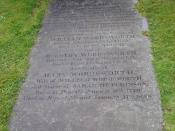The expansion and development of cities in the Romantic and Victorian periods brought about many social changes, such as increase in trade, industrialisation, and population which began to change the way people had lived for centuries. In the following essay I will study how these social forces are represented in literary material of that era and also from critical sources. I will begin by examining William WordsworthÃÂs ÃÂResidence in LondonÃÂ from The Prelude, alongside Raymond WilliamÃÂs ÃÂChange in the CityÃÂ, which are significant in regards to the Romantic era. I will also examine Hard Times by Charles Dickens with relevant contextual essays, which are significant when looking at the Victorian City.
In writing ÃÂResidence in LondonÃÂ, William Wordsworth presents himself as a flâneur-like figure. He carefully observes the goings-on which are happening around him, and he depicts London society in all ÃÂthe wealth, the bustle and the eagernessà(Wordsworth: 161: 109) it had begun to accumulate.
London had quickly become the place for trading and earning money. By 1800, ÃÂwith nearly a million inhabitants, no European capital surpassed LondonÃÂs size.ÃÂ (Chandler: 2) This increase in population and increase in trade alike meant that the city was full of ÃÂstrangersÃÂ (Wordsworth: 120: 108) of all kinds. He claims seeing people of many different cultures, Italian, Jewish, Turkish, Swedish and French, to name but a few. The prospect of work and the increase of ÃÂshop after shopÃÂ (Wordsworth: 174: 109) in London, in the Romantic city, had attracted people looking to earn a living from all over Europe and this shows the beginnings of a multi-cultural city emerging. Measures were ultimately taken to try and decrease the cityÃÂs population. Raymond Williams asserted that although ÃÂa Bill against new houses was attemptedÃÂ (Williams: 145), this inevitably led to ÃÂa long-continued wave of...


